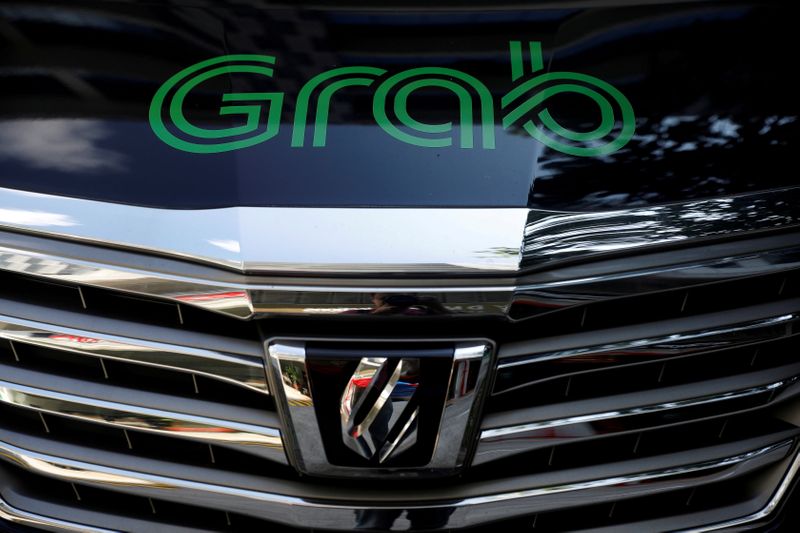(Reuters) - Grab, Southeast Asia's biggest ride-hailing and food delivery firm, lists on Nasdaq on Thursday following its $40 billion merger with special-purpose acquisition company (SPAC) Altimeter Growth Corp.
The deal is the world's biggest ever by a blank-check company and the biggest U.S. listing by a Southeast Asian firm.
WHAT IS GRAB?
Founded in 2012, Grab is Southeast Asia's largest startup, valued at just over $16 billion last year. It launched as a Malaysian taxi-hailing service and now calls itself a "superapp" after expanding into food, grocery and parcel delivery and to digital payments, lending and other financial services.
Singapore-headquartered Grab operates across 465 cities in eight countries in the region, counting Indonesia as its biggest. Its venture with Singapore Telecommunications Ltd was awarded a digital bank license in Singapore last year.
Grab gained the global spotlight in 2018 when it bought the Southeast Asian business of Uber Technologies (NYSE:UBER) Inc in return for the U.S. ride-hailing company taking a stake in Grab.
With some 8,000 employees, Grab has tech centres in Singapore, Beijing, Seattle, Bengaluru and other places.
WHO'S BACKING GRAB?Early investors include Japan's SoftBank, China's Didi Chuxing and venture capital firms Vertex (NASDAQ:VRTX) Ventures Holdings and GGV Capital.
Grab raised about $12 billion ahead of the listing. Investors range from venture and hedge funds to automobile companies and other ride-hailing firms, and include:
Uber, Booking Holdings (NASDAQ:BKNG) Inc, China Investment Corp, Coatue Management, Hillhouse Capital, Hyundai Motor Co, Invesco Ltd, Microsoft Corp (NASDAQ:MSFT), Ping An Capital Co, Toyota Motor (NYSE:TM) Corp, and Yamaha Motor Co..
In the SPAC deal, about three dozen investors came on board including Temasek Holdings, BlackRock (NYSE:BLK), Fidelity International, Abu Dhabi's Mubadala and Malaysia's Permodalan Nasional Bhd and Altimeter Capital.
WHO'S THE COMPETITION?GoTo Group, formed by the merger of Indonesian ride-hailing and deliveries firm Gojek and local e-commerce leader Tokopedia is Grab's biggest competitor.
Singapore-based Sea Ltd, which has e-commerce, gaming and a digital payments business, and is also muscling into food delivery and financial services in Indonesia. Sea has also won a digital bank license in Singapore.
Grab is likely to increasingly start competing with banks as it expands its financial services.
It also competes with such delivery companies as Foodpanda and Deliveroo PLC.
WHAT ARE GRAB'S FINANCIALS?
Grab's third-quarter revenue fell 9% from a year earlier to $157 million. Its adjusted loss before interest, taxes, depreciation and amortization (EBITDA) widened 66% to $212 million. Gross merchandise value hit a quarterly record of $4 billion.
The delivery business has emerged as the biggest segment as more consumers shifted to online food delivery during the pandemic.
Grab forecasts it will turn profitable on an EBITDA basis in 2023.
WHO ARE ITS KEY EXECUTIVES?
Anthony Tan, 39, is the company's CEO and co-founder.
Fellow co-founder Tan Hooi Ling, 38, runs Grab's operations, including corporate strategy and technology.
Both Tans, unrelated, met at Harvard Business School, where they conceived the idea of the ride-hailing company.
Grab's president, Ming Maa, is a prominent dealmaker from SoftBank, who joined the company in 2016.
Is MSFT truely undervalued?
With MSFT making headlines, investors are asking: Is it truly valued fairly? InvestingPro's advanced AI algorithms have analyzed MSFT alongside thousands of other stocks to uncover hidden gems with massive upside. And guess what? MSFT wasn't at the top of the list.
Unlock ProPicks AI

